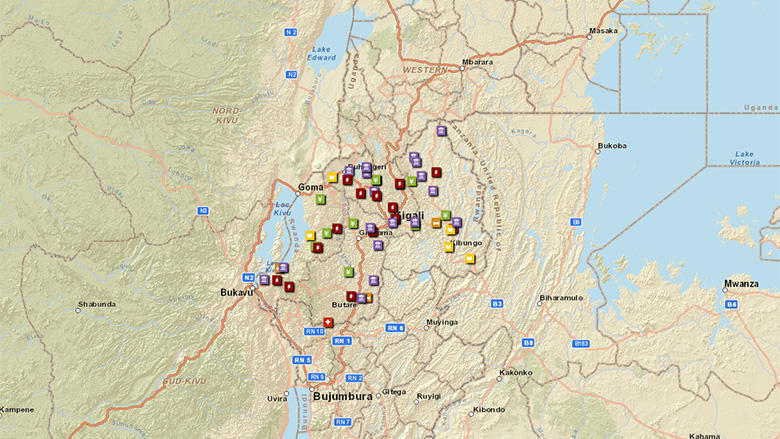Challenge
In the aftermath of the 1994 Genocide, Rwanda established a national Demobilization and Reintegration Commission that worked with the United Nations (UN) and the World Bank to reduce the risk of regional instability, while creating space for long-term development. With the original Rwanda Demobilization and Reintegration Project (RDRP), the Government of Rwanda (GoR) sought to draw down the Rwandan Defense Forces and enhance regional demobilization by welcoming all armed groups and their dependents to return to Rwanda for assistance and reintegration support. Nevertheless, demobilization and security remains a central component of Rwanda’s Poverty Reduction Strategy and the Bank’s Country Assistance Strategy, specifically as ways to consolidate development gains and continue to build national capacity. The GoR was able to implement the components of the first RDRP efficiently with high quality, while adjusting to lessons learned.
Solution
The Second Emergency Demobilization and Reintegration Project supports the GoR in demobilizing members of Rwandan armed groups and the Rwanda Defense Force and providing socioeconomic reintegration support to the demobilized, particularly female, child, and disabled ex-combatants. The project aims to increase the number of beneficiaries settled in their chosen communities of destination, improve the capacity of these beneficiaries to advance their own socioeconomic reintegration, and increase the access of ex-combatants to government support service mechanisms. The target group for demobilization consists of 5,500 former combatants from armed groups, 500 child soldiers, and a maximum of 4,000 members of the Rwandan Defense Force (RDF). Each ex-combatant will receive a $95 discharge grant to cover transport home, basic household items, food, and medical insurance. Reintegration will consist of social and psychosocial support, HIV/AIDS orientation into support frameworks, sensitization, and national reconciliation activities at the community level. Additionally, ex-combatants will receive job training, formal education, and employment support and counseling.
Results
As of October 2012:
- 53.3 percent of ex-combatants reported social acceptance by their communities.
- 67.1 percent of ex-combatants were economically active.
- 100 percent of ex-combatants had their demand for demobilization services met.
- 10,029 members of armed groups had been demobilized (2,938 by this project).
- 26,585 RDF members had been demobilized.
- 86 percent of ex-combatants had an ID card and medical insurance six months after demobilization.
- 100 percent of severely disabled ex-combatants received their due benefits within nine months of demobilization.
- 100 percent of ex-combatants have settled down in their community of choice with access to shelter and food security.
- 7,932 resettlement kits were delivered to dependents of ex-armed group members.
- 91 percent of demobilized individuals were satisfied with the services and information provided in the demobilization centers.
Bank Group Contribution
As of October 2012, the International Development Association (IDA) had contributed $6.89 million to the project, approximately 86 percent of its total planned contribution. Two trust funds (97476, 97484) had disbursed a combined $5.29 million, with an additional $3.8 million to be disbursed.
Partners
The United Nations Organization Stabilization Mission in the Democratic Republic of the Congo (DRC) (MONUSCO) will assist in the disarmament and repatriation of ex-combatants from the DRC and other surrounding countries.
Moving Forward
The project is currently being considered for extension until December 2013. The project is considering the organization of a new cycle of vocational training and apprenticeship for beneficiaries.
Beneficiaries
N/A
